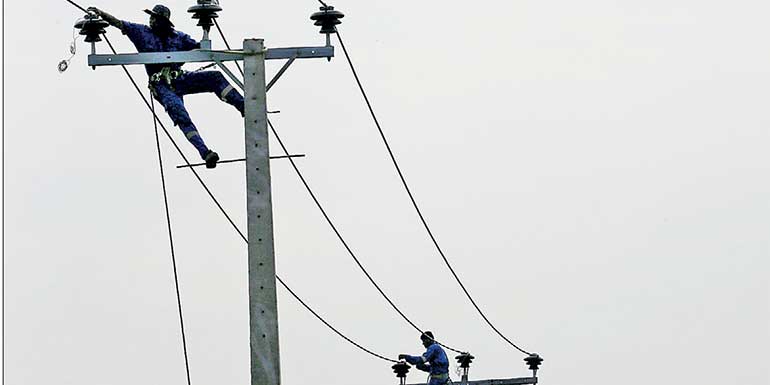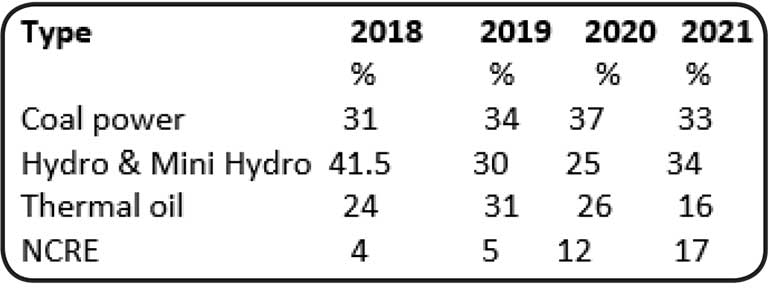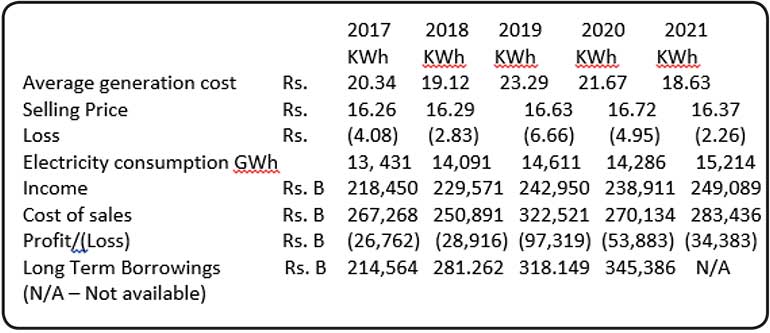Wednesday Feb 18, 2026
Wednesday Feb 18, 2026
Thursday, 29 December 2022 00:11 - - {{hitsCtrl.values.hits}}

The power sector is of strategic importance for the economy and hence, needs to be safeguarded and follow tried and tested systems to be implemented on a gradual basis, especially at a time the country is in a deep economic crisis
|

Introduction
The framework on Managerial and Societal Costing prepared and issued by the Cost and Management Accounting Standards Board of Sri Lanka (CMASB) under the Institute of Certified Management Accountants of Sri Lanka incorporated by Parliament Act No. 23 of 2009, makes available the Managerial and Societal Costing Framework to private and public sector business organisations and regulatory authorities to provide proper cost accounting practices in the pricing of goods and services to benefit society to obtain the goods and services at affordable and reasonable prices.
This will be further strengthened by the state and private sector adopting good governance, transparency and accountability practices which will enable the benefits of the societal costing framework to flow to the citizens.
Recent price increase in electricity
The price increases of electricity which took place after the recent public consultations will have serious impact on business and the society and need to take into account the costing and pricing to reflect the least cost methodology without causing undue burden to the consumers and to reflect efficiency in the supply chain of purchasing of raw materials, production and distribution of electricity. This would enable the electricity pricing to be carried out in a professional efficient cost reflective methodology without burdening the consumer of inefficiencies and wastages and arriving at the least cost of generation, transmission and distribution.
Considering the earlier Tariff revision done by the Public Utilities Commission (PUCSL) in arriving at a cost reflective methodology they recommended the following:
a)The Distribution Licensee (CEB) had proposed to raise its revenue by 82% with the implementation of the proposed tariff. However, the Commission was of the view that the maximum revenue increase should not be more than 57% for which the Commission recommended to the Treasury to pay Rs. 60 billion as the subsidy for Ceylon Electricity Board.
Thereafter a price revision effective from 10 August 2022 was carried out. The new tariff revision was implemented under six categories namely Domestic category, General purpose category, Industry category, Government category, Hotel category and religious category. The revision provided reliefs to domestic electricity consumers. The hike in tariffs was kept at a maximum of 75%. The consumers of all categories protested on the price increases as they were exorbitant.
However now the cabinet has approved a further increase which is expected to cover the current loss of CEB and the electricity bill should increase by about 70%. This increase will be ill affordable by all types of consumers. Hence methods to have the right mix of power generation, overcome the depreciation in currency, efficient supply chain operation to purchase of the raw materials at the right price which are app. 80% of cost of production and varies with the fluctuation of the fuel prices needs strict monitoring to ensure that the consumers are not burdened with unnecessary price increases at a time that all prices are rising and inflation is at its highest.
b) The Sri Lankan power sector includes the Ceylon Electricity Board which includes the Generation, Transmission and Distribution. LECO currently operates as a distributor of one defined area whereas all others are handled by the CEB. Hence as seen in many other countries and studies done by International Agencies better management, efficiency, productivity and an affordable pricing to the consumer avoiding wastages, losses could be achieved by the unbundling of these three activities which are now carried on by one undertaking.
c) We have noticed that the increase in the power costs is mainly due to the depreciation of the Sri Lankan rupee against the US Dollar which has resulted in the import prices of fuel and coal rising together with the rising trends in world prices.
 Power generation mix
Power generation mix
We should realise that a proper power generation mix is the key determining factor of CEB’s profitability and financial viability.
In the two years of 2013 and 2015 that CEB made a profit the major reasons were the cost of production reducing drastically due to the generation mix been favourable where more hydro power generation took place, with low use of expensive thermal fuel and commencing the coal power plant with the use of thermal coal which enabled the cost to come down drastically when compared with fuel.
In 2015 the availability of hydro and use of coal enabled CEB to change the mix with coal generation 34%, hydro 46%, fuel reduced to 17% and NCRE 3% which enabled the average price to the consumer to be reduced from Rs. 19 to Rs. 16 per KWh on average enabling the CEB to earn a profit of Rs. 20.9 billion after foregoing a total of Rs. 18.8 billion due to price reduction to the consumer.
a) CEB has a mix of power generation which includes:
-Hydro
-Thermal – includes Petroleum and Coal
-Non-Conventional Renewable Energy (NCRE) – Solar, Bio Mass, Windpower, Mini Hydro
-IPP – Independent power producers
b) A percentage mix of generation from 2018 to 2021 was seen as follows.
In 2020 the CEB generation was 71% and IPPs 29%. In 2019 CEB generation was 76% and IPPs 24%. This was mainly due to the renewable energy going up from 12% in 2019 to 17% in 2020. Hence this is the sector that needs to be given the immediate priority to increase the solar and wind power for which the investment can be undertaken by the private sector. Good progress had been made in the solar top housing project and hence this could be expanded further with the business sector investing on a large scale without bureaucratic controls delaying projects.
Thermal power both coal and oil generation need to be controlled as an increase in either will result in a drain in foreign exchange, increased costs and an increase in costs of operation. In 2018 thermal power was 55% with a loss of Rs. 28,916 billion, 2019 65% with a loss of Rs. 97,358 billion, 2020 63% with a loss of Rs. 53,883 billion and 2021 49% with a loss Rs. 34,383 million or Rs. 2.26 per unit compared to Rs. 4.07 per unit in 2020 the reduction mainly due to less thermal and more hydro which is the cheapest mode and also saves foreign exchange.
The variation in the generation of hydro power was 41.5%, 30% in 2019, 25% in 2020 and 34% in 2021.
Purchasing fuel and coal at the right price and at the right time is imperative for the cost efficient operation of CEB and any delayed purchasing of coal resulting in the use of more expensive fuel will result in higher generation costs of electricity and these additional costs cannot be passed on to the consumers as these are operational inefficiencies.
c) The power generation mix is an important determinant in the cost of electricity as well as the profitability and viability of CEB.
Details extracted from the CEB Annual Reports and Statistical statements are given below.
In 2020 the cost of power generation in the different power plants were as follows.
Thermal fuel – Rs. 29.94 per KWh
Thermal coal – Rs. 9.81 per KWh
Hydro – Rs. 2.32 per KWh
Overall – Rs. 9.90 per KWh
 CEB and regulatory authority
CEB and regulatory authority
a) It has been noted that although the CEB Act in 1969 intended it to be a commercial enterprise with monopoly for electrical generation, transmission and distribution in the country, with time it evolved to be a purely service-oriented enterprise without the ability to determine the selling price of electricity in order to provide consumers with subsidised electricity resulting in huge losses and debts.
b) Regulatory authorities have been set up by many countries to take care of tariffs and other regulatory measures. Information submitted by the utilities must be vetted by financial/management accounting experts. Moreover, the thrust should be to promote competition, improve efficiency and economy so that the affordable quality power is accrued to the consumer.
Cost records and cost audit
a) The power generating company shall forecast its costs based on the variable direct costs which should be properly recorded in the cost accounting records. There should be cost accountants engaged in this exercise and the lack of a Cost and Management Accounting department is seen in the organisation chart of CEB. This is a must to cover all generating plants and calculating the correct costs which includes all direct materials used especially fuel and coal, the output from each generation plant with operating norms, determine wastages, inefficiencies to be efficient and effective.
b) In the transmission and distribution too, proper records need to be maintained with qualified cost accountants. All data provided need to be validated and an analysis of assumptions need to be carried out.
c) Cost records means books of accounts relating to the utilisation of material, labour and other items of cost as applicable to the generation, transmission and distribution of electricity. This needs to be mandatory for all manufacturing and service organisations to get the proper costs and not estimates as done in many areas.
d) The cost records shall be kept in regular basis in such manner to make it possible to calculate per unit of cost of production or cost of operation, cost of sales, margin for each of its products and activities for every financial year, or on monthly, quarterly, half yearly or annual basis.
e) All such cost records and cost statements maintained shall be reconciled with the audited financial statements for the financial year specifically indicating expenses or income not considered in the cost records and statements to ensure accuracy and to reconcile the profit/loss of all groups within the overall profit and loss.
One should maintain all such cost records for a minimum period of eight years.
f) Cost Audit – The CEB should maintain proper cost records in the generation, transmission and distribution and this should apply to all IPPs, LECO and all others in the electricity industry and a separate Mandatory Cost Audit should be carried out by a Cost Auditor a member approved by the Institute of Certified Management Accountants (CMA) of Sri Lanka a body incorporated by an Act of Parliament. This will ensure that the cost which is ultimately passed on to the consumer has been duly audited and carried out in the least cost methodology and any inefficiencies and wastages will be reported. The Cost Audit will be based on the Cost Accounting records and different from a financial audit and is compulsory in many South Asian countries. The Cost Audit is a mandatory requirement in India for the electricity sector and enables this sector to be competitive, efficient and productive.
Unbundling of the electricity industry
The Government has already decided to unbundle the Generation, Transmission and Distribution divisions of the CEB.
This is also due to the large losses incurred and the heavy bank borrowings and inability to pay its creditors on the due date. This may not be the case if the full facts are taken into account due to the Government determining the prices below the cost and not reimbursing the subsidies making them look an inefficient industry. However, in order to improve efficiency, productivity and avoid political interference the decision for unbundling the industry has been approved by the Government and a committee appointed. This needs to be done in a proper manner and the best mode is to go for public private partnership and list the companies on the Colombo Stock Exchange to get rid of the undue interference from the Government.
However, a strong independent regulator fully equipped to monitor the power sector is very essential in carrying out this exercise of unbundling in order to have safeguards for the industry and the consumer. Cross country studies have shown that the profitability increases more and productivity less in markets that are less regulated and less competitive with customers penalised and pay more.
Power companies should also be distanced from government to avoid political interference. The power sector is of strategic importance for the economy and hence needs to be safeguarded and follow tried and tested systems to be implemented on a gradual basis especially at a time the country is in a deep economic crisis. The commencement of the unbundling from the distribution sector which already can be justified with the LECO operation been a success, can be a very good start.
Also, rapid growth and development of the renewable energy sector with participation from the private sector should be a priority and industrialists and large consumers of electricity should be brought in to undertake these investments speedily.
In the case of generation of power especially in the hydro sector the raw material which is water is supplied free of charge at no cost. At present the average generation cost of hydro is Rs. 2.32 per KWh very much less than thermal (fuel) Rs. 29.94 per KWh and Rs. 9.81 per KWh for coal. Further the capital costs incurred for hydro generation are very high and hence whether an equitable, transparent method for unbundling could be worked out is a matter of great concern.
- CEB as a priority should promote Private Sector Non-Conventional Renewable Energy (NCRE) – Solar, Bio Mass, Windpower, Mini Hydro.
The CEB had success with roof top solar panels and the net metering system. It is suggested that all manufacturing industries and other big consumers of electricity be given a similar scheme for generation of electricity on the net metering system which will enable CEB to speed up the generation of electricity from these large consumers without red tape. This could be also carried out in plantation companies which have hydro catchment areas to promote mini hydros and could use it for their own factories. In many cases there have been undue delays and these plantations put at a disadvantage due to red tape and blocking these projects to give to other unknown parties. The solar and windpower are the other two sectors which have good opportunity and will be our saviour.
Power wheeling to support industrialists and large consumers of electricity
Power wheeling is another scheme that has been successfully used in other countries and will enable industrialists and other big consumers to produce power in another area and give it to the CEB and set off against their consumption. This practice is used in many countries and has been a success.
Conclusion
The power sector has come to the limelight due to the recent announcement to increase of electricity prices in 2023. This is in addition to the increase that took place in October 2022. However, despite these increases the Government has announced another increase from 2023 and this will be a major burden on the consumer and a disaster for economic development.
However, a further price increase could be avoided if we work on the right mix of generation and bring in efficiency in the supply chain, least cost generation, saving of foreign exchange and cost reductions by use of hydro and renewables and prevent any adverse impacts on industry, commerce and the society.
It is also seen and heard that due to delays in purchasing and the supply chain that the cheaper coal power may not be available in 2023 and hence the more expensive fuel will have to be used to cover up and this additional expenditure is going to be passed onto the consumer and hence the sudden price increase. If this the case then it is a very exceptional matter and needs immediate corrective action without consumers been penalised in these difficult times.
The need of a strong regulator fully equipped similar to such undertakings in our neighbouring countries will also be greatly beneficial for the industry.
In the case of unbundling of the electricity sector and ridding it from political interference, it needs to go ahead and should commence initially with the distribution which has been successful both locally and globally with all such restructuring and reforms undertaken in the best interests of the country and in the public interest enabling Sri Lanka to come out of the crisis ridden situation and move towards rapid industrialisation and strong economic growth and development.
(The writer is President, Institute of Certified Management Accountants of Sri Lanka, Past President Institute of Chartered Accountants of Sri Lanka, Past President South Asian Federation of Accountants (SAFA), former Chairman People’s Bank, former Chairman, and Director General Board of Investment of Sri Lanka. He was responsible for the implementation of the BOI 200 Garment factories Programme which is the largest foreign exchange earner for Sri Lanka.)